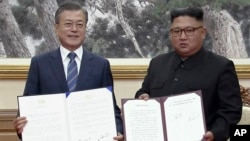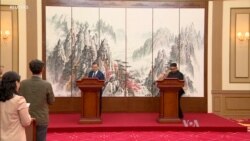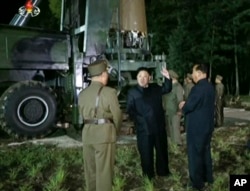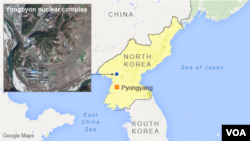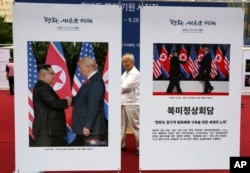The leaders of North and South Korea Wednesday hailed a series of agreements they said were aimed at turning the Koreas into a “land of peace without nuclear weapons and nuclear threats.” North Korean leader Kim Jong Un and South Korea’s Moon Jae-in Wednesday issued the pledge at a summit in the North’s capital, Pyongyang.
WATCH: Steve Miller's video report
The announcement prompted U.S. Secretary of State Mike Pompeo to invite North Korean Foreign Minister Ri Yong Ho to meet in New York next week, where both are scheduled to attend the United Nations General Assembly.
Pompeo said the United States is ready to engage in talks with North Korea immediately, with the aim of completing Pyongyang’s denuclearization by the end of President Donald Trump’s first term.
Kim’s decision to dismantle its key missile site at Dongchang-ri in the presence of international observers is what Pompeo said prompted his decision to make the invitation.
US prepared to engage
“On the basis of these important commitments, the United States is prepared to engage immediately in negotiations to transform U.S.-DPRK relations,” Pompeo said in a statement.
“We, as the Ministry of Foreign Affairs, think that it will be able to accelerate denuclearization and bring peace on the Korean Peninsula through the U.N. General Assembly next week,” said ministry Special Representative for Korean Peninsula Peace and Security Affairs Lee Do-hoon, who added that the development may lead to a second summit between the United States and North Korea.
“While this (the outcome of the third inter-Korean summit) may look small ... our role is to hand over (the conversation) to the U.S.,” Lee said.
Pyongyang drew an enthusiastic response from Trump, who tweeted the news coming out of the third inter-Korean summit, saying it was “very exciting!” even though some analysts point out that specific details remain absent and a path to denuclearization is not clear.
What are ‘corresponding measures?’
In addition to pledging to dismantle the Dongchang-ri missile test site, the Pyongyang Declaration put forward that the North “expressed its willingness to continue to take additional measures, such as the permanent dismantlement of the nuclear facilities in Yongbyon, as the United States takes corresponding measures in accordance with the spirit of the June 12 US-DPRK Joint Statement.”
Even though it was not specified in the agreement signed Wednesday between Moon and Kim, the Sejong Institute’s Woo Jung-yeop assumes North Korea means they’re looking for a declaration from Washington to formally end the Korean War.
“So it is apparent that North Korea is willing to exchange [a] declaration to end the war [in exchange for] the demolition of the Yongbyong facility,” said Woo.
The Council of Foreign Relations’ Scott Snyder said an end-of-war declaration in exchange for a declaration of North Korean assets appears to be under consideration.
But, he said the critical factor for that formula to work is to ensure that all parties realize “those declarations are simply aspirations designed to achieve an objective and they are expressions of seriousness of intent to achieve objectives.”
Ajou University professor Kim Heung-kyu notes a balance of trust needs to be established between each party, otherwise it’s difficult to proceed with negotiations.
However, North Korea may not be satisfied with a declaration-for-declaration formula, “because North Korea is fully aware of the time constraint and the changing political situation in the United States.”
He said this is leading Kim Jong Un to become more ambitious “to achieve more.”
Second Trump-Kim summit?
Moon said North Korean leader Kim Jong Un wants to hold a second summit with President Trump to hasten the process of denuclearizing the Korean peninsula.
He revealed Kim’s wishes Thursday in Seoul, after his return from his visit to Pyongyang.
Moon will travel to New York next week for the United Nations General Assembly, where he will meet with Trump, Sept. 24. The South Korean leader said Wednesday he looked “forward to North Korea and the United States resuming their dialogue soon, based on the achievements of this Pyongyang summit.”
Harry Kazianis, director of defense studies at the Center for the National Interest, believes the possibility of a second Trump-Kim summit is “100 percent,” adding it could also be a trilateral summit with Moon, or even a quadrilateral meeting with Chinese President Xi Jinping, because Moon hasn’t revealed everything regarding Kim’s plans to denuclearize.
“I think [Moon] understands that he needs to hold some things close to the chest to be able to bring to Donald Trump, maybe additional concessions. ... Maybe Kim Jong Un made some other proposals that we don’t know about today, and that makes sense,” said Kazianis.
Lee Ju-hyun contributed to this report.




